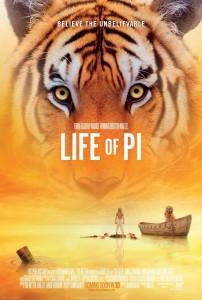 Life of Pi should be required viewing for all followers of Jesus — especially now, in this time of massive change that Phyllis Tickle calls “The Great Emergence,” which is marked by at least these two things (and surely more): missional shift and overwhelming religious/spiritual pluralism.
Life of Pi should be required viewing for all followers of Jesus — especially now, in this time of massive change that Phyllis Tickle calls “The Great Emergence,” which is marked by at least these two things (and surely more): missional shift and overwhelming religious/spiritual pluralism.
This postmodern parable, based on the best-selling book by Yann Martel, is the most deeply spiritual film I’ve seen in a long, long time. And the message is clear: Religions are stories that help us understand God and our own lives. And ultimately, we must all ask, as the lead character, Piscine “Pi” Patel, does at the end of the film, “Which story do you prefer?”
As we learn at the beginning of the film, Pi is a deeply religious young man. His interest in different faiths and beliefs has him converting from Hinduism to Christianity to Islam — well, not really converting from/to but adding each additional faith on top of the other. The adult Pi (who is telling the story) jokes, “Catholic Hindus get to feel guilty before hundreds of gods!”
Pi’s father, however, is a man of science and reason, a real “Enlightenment” era individual, who teaches his son a painful lesson to prove that humans are above animals on the evolutionary scale — and that he best not forget it.
This is the spiritual and philosophical milieu in which Pi grows up, and later, as a teenager, he experiences a trauma that is hard to fathom. The bulk of the film explores the solitary journey Pi takes, which stretches his faith in a Divine Other to the breaking point.
One of the best exchanges in the film is between Pi and the writer he is telling his life’s story to:
Pi: “Faith is a house with many floors.”
Writer: “But no room for doubt?”
Pi: “Oh yes! On every floor.”
The original novel promised to “make you believe in God.” Ultimately, it is his own spiritual experience that Pi testifies to when he says, “As for God, I can only tell you my story. You will decide for yourself what to believe.”
That is the dilemma we face in the Church today and the triumph of Life of Pi as a vehicle for communicating this powerful truth: The big story of the Christian Gospel no longer holds hegemony in U.S. culture. It is increasingly but one among many vying for attention and adoration and commitment from the masses. There are two startling implications to this: First, followers of Jesus will need to practice greater humility in approaching people of other faiths and spiritualities (or those who profess no faith at all), and engaging in interfaith dialogue for the sake of understanding and partnership in making the world a better place should become a high missional priority.
Secondly, on a personal level, this should force us to rethink “evangelism” entirely. We may have the most beautiful, powerful story on offer — one of a self-giving God of love who brings salvation for all of creation — but many will still embrace other narratives that make more sense for them and their lives.
Our task is simply to live out (and live into) that beautiful Jesus story and continue to invite others into that story, as well. We can’t just tell someone what to believe, anymore. It’s not that easy. We have to tell our story, connected to and a continuation of the Jesus story we love, and simply say, “Which story do you prefer? Which is the better story? … And so it goes with God.”
Have you seen Life of Pi? or read the book? What did you think? Let me know your thoughts in the comments!
 Note: This is a contribution to a Movie Club feature on Life of Pi. Through our Movie Channel, Patheos works together with movie studios to host conversations about films that raise basic moral and spiritual questions. Follow Patheos Movies on Facebook.
Note: This is a contribution to a Movie Club feature on Life of Pi. Through our Movie Channel, Patheos works together with movie studios to host conversations about films that raise basic moral and spiritual questions. Follow Patheos Movies on Facebook.












